
Organics
Scope & Guideline
Catalyzing Discoveries in Organic Research
Introduction
Aims and Scopes
- Coordination Chemistry and Metal Complexes:
The journal emphasizes research on metal-organic frameworks (MOFs) and coordination compounds, exploring their synthesis, structural properties, and potential applications in catalysis and drug delivery. - Nanomaterials and Nanocomposites:
Research on the synthesis and application of nanostructured materials, including metal nanoparticles and their composites, is a core focus, particularly in fields such as photocatalysis and energy storage. - Organic Synthesis and Functionalization:
The journal publishes studies on the development of new synthetic methodologies and the functionalization of organic compounds, including the use of various ligands in metal complexation. - Biological and Medicinal Chemistry:
There is a consistent focus on the biological activities of organic and metal-organic compounds, with research exploring their potential as therapeutic agents against diseases, including cancer. - Environmental Applications:
The journal also covers research related to the environmental applications of organic compounds, such as the removal of pollutants and heavy metals from water.
Trending and Emerging
- Sustainable and Green Chemistry:
There is a growing emphasis on sustainable methods for synthesizing organic compounds, including the use of renewable resources and eco-friendly solvents, reflecting a global push towards greener practices in chemistry. - Photocatalysis and Solar Energy Conversion:
Research focused on photocatalytic materials and their applications in energy conversion and environmental remediation is on the rise, highlighting the importance of harnessing solar energy. - Metal-Organic Frameworks (MOFs) and Their Applications:
The exploration of MOFs for various applications, including gas storage, separation, and catalysis, has emerged as a significant trend, with numerous studies investigating their synthesis and functionalization. - Bioinorganic Chemistry:
There is an increasing interest in the role of metal complexes in biological systems, with studies focusing on their potential as therapeutic agents and their interactions with biomolecules. - Advanced Characterization Techniques:
The use of advanced characterization methods, such as X-ray diffraction, spectroscopy, and computational modeling, is becoming more prevalent, enhancing the understanding of the structures and properties of organic materials.
Declining or Waning
- Traditional Organic Synthesis:
There is a noticeable decrease in papers focused solely on traditional organic synthesis methods without the incorporation of novel materials or advanced techniques, indicating a shift towards more interdisciplinary approaches. - Inorganic Compounds without Biological Relevance:
Research focusing on purely inorganic compounds that lack biological or environmental relevance has become less frequent, suggesting a trend towards studies that emphasize practical applications. - Basic Theoretical Studies:
The journal has seen fewer publications centered on basic theoretical studies in organic chemistry, as the emphasis has shifted towards applied research with clear experimental validation.
Similar Journals
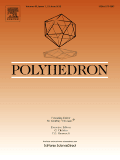
POLYHEDRON
Innovating Research in Inorganic and Theoretical Chemistry.POLYHEDRON is a prestigious academic journal published by Pergamon-Elsevier Science Ltd, specializing in the fields of Inorganic Chemistry, Materials Chemistry, and Physical and Theoretical Chemistry. With its ISSN 0277-5387 and E-ISSN 1873-3719, the journal has been a significant outlet for groundbreaking research since its inception in 1982 and continues to be influential for scholars and practitioners. As of 2023, it holds a Q3 quartile ranking across its categorization, underscoring its impact within the scientific community with respectable Scopus Rankings that place it in the top percentiles of relevant fields. Situated in the United Kingdom, POLYHEDRON aims to foster the exchange of innovative ideas and findings related to polyhedral molecules and structures, making it an essential resource for researchers seeking to expand their knowledge and contribute to these dynamic areas of study. While currently not an Open Access journal, it remains committed to advancing education and research by providing quality content that serves both academic and practical applications.
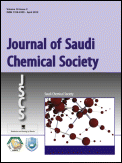
Journal of Saudi Chemical Society
Bridging Ideas and Innovations in Chemistry.The Journal of Saudi Chemical Society, published by ELSEVIER, stands as a premier platform for advancing knowledge in the field of chemistry. Since its inception in 2009, this Open Access journal has garnered significant attention, securing a prestigious Q1 ranking in the Chemistry (miscellaneous) category for 2023, reflecting its position among the top journals in the discipline. With an impressive Scopus ranking of #66 out of 408 in General Chemistry, this journal boasts a commendable 83rd percentile, underscoring its impact and relevance in the global research community. The journal aims to disseminate high-quality research articles, reviews, and case studies, fostering innovation and collaboration among chemists and allied professionals. By enabling widespread access to cutting-edge research, the Journal of Saudi Chemical Society plays a crucial role in supporting the educational and professional development of students, researchers, and practitioners alike, making it an essential resource for anyone invested in the dynamic field of chemistry.

RUSSIAN JOURNAL OF INORGANIC CHEMISTRY
Championing Excellence in Chemical ResearchThe Russian Journal of Inorganic Chemistry is a distinguished publication that delves into the fundamental and applied aspects of inorganic chemistry. Published by MAIK Nauka/Interperiodica/Springer, this journal has established itself as a vital resource for researchers, professionals, and students alike, contributing significantly to the fields of Inorganic Chemistry, Materials Science, and Physical and Theoretical Chemistry. With an ISSN of 0036-0236 and an E-ISSN of 1531-8613, the journal is indexed for easy access and citation. Though the journal currently operates under a subscription model, its commitment to disseminating high-quality research and fostering scientific discourse remains steadfast. The journal has been maintaining a consistent record since its inception, and its positioning in the Q3 quartile across various chemistry categories in 2023 underscores its relevance in the academic community. As it continues through its converged years from 1996 to 2024, the Russian Journal of Inorganic Chemistry plays a pivotal role in enhancing the understanding and advancement of inorganic chemistry, making it an indispensable tool for anyone engaged in this dynamic field.

RUSSIAN JOURNAL OF COORDINATION CHEMISTRY
Pioneering Research in Metal-Organic RelationshipsThe Russian Journal of Coordination Chemistry, published by Pleiades Publishing Inc, stands as a significant contribution to the field of coordination chemistry, focusing on the intricate relationships between metal ions and organic molecules. With an ISSN of 1070-3284 and an E-ISSN of 1608-3318, this journal has been curating high-quality research since its inception in 1996. Though it currently does not offer open access, the journal plays a crucial role in disseminating innovative findings, evidenced by its Q3 ranking in both Chemical Engineering and Chemistry categories as of 2023. With Scopus rankings placing it in the 40th percentile among general chemistry and chemical engineering journals, it demonstrates a commitment to advancing knowledge in these vital areas. The journal invites researchers, professionals, and students alike to engage with its comprehensive articles that explore both theoretical and practical aspects of coordination chemistry, supporting the development of new applications and techniques within the field.
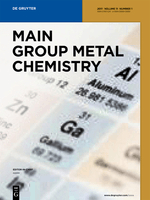
MAIN GROUP METAL CHEMISTRY
Empowering Researchers with Open Access InsightsMAIN GROUP METAL CHEMISTRY, published by De Gruyter Poland Sp. z o. o., is an esteemed open access journal that has made a significant impact in the fields of Chemistry, Condensed Matter Physics, and Materials Science since its inception in 1988. With its ongoing publication aimed at advancing scholarly discourse until 2024, this journal is indexed in leading databases and has earned a diverse readership due to its rigorous peer-review process and relevant contribution to the understanding of metal chemistry. In the 2023 category quartiles, it has been recognized as Q2 in Metals and Alloys and holds Q3 rankings in Chemistry (miscellaneous), Condensed Matter Physics, and Materials Chemistry, showcasing its interdisciplinary appeal and recognition in the scientific community. The journal's innovative open access model, implemented in 2019, enhances visibility and accessibility for researchers worldwide, fostering collaboration and discovery among professionals, students, and academics alike. By presenting high-quality research and critical reviews, MAIN GROUP METAL CHEMISTRY serves as a vital resource for those seeking to deepen their understanding of metal interactions and their applications in advanced materials.
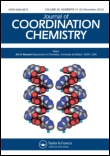
JOURNAL OF COORDINATION CHEMISTRY
Bridging Theoretical Concepts and Practical ApplicationsJOURNAL OF COORDINATION CHEMISTRY is a prestigious academic journal published by Taylor & Francis Ltd, focusing on the vital intersection of materials chemistry and physical and theoretical chemistry. Since its inception in 1971, the journal has provided a platform for disseminating high-quality research that explores the coordination chemistry of metals and its implications in various scientific domains. With an ISSN of 0095-8972 and an E-ISSN of 1029-0389, this journal serves a diverse community of researchers and professionals dedicated to advancing their understanding of coordination compounds and their applications. The journal's current rankings place it in the Q3 category for both Materials Chemistry and Physical and Theoretical Chemistry, with Scopus rankings highlighting its relevance and contribution to these fields. The absence of open access underscores the journal's commitment to maintaining rigorous academic standards while ensuring a broad reach through reputable publication practices. As it converges toward 2024, JOURNAL OF COORDINATION CHEMISTRY invites contributions that push the boundaries of knowledge and foster innovative research in multiple contextual applications.

REVIEWS IN INORGANIC CHEMISTRY
Navigating Trends and Challenges in Inorganic ScienceREVIEWS IN INORGANIC CHEMISTRY, published by Walter de Gruyter GmbH, is a distinguished academic journal that serves as a vital resource for researchers, professionals, and students within the field of inorganic chemistry. With its ISSN 0193-4929 and E-ISSN 2191-0227, this journal has made a significant impact on the discipline, holding a commendable Q2 ranking in the 2023 category of Inorganic Chemistry, placing it in the 81st percentile among its peers according to Scopus rankings. Continuously published since its inception, with converged years spanning from 1985 to 1990 and 1992 to 2024, it features comprehensive reviews encompassing the latest advancements, methodologies, and theoretical frameworks in the subject. Researchers will find IDEAL insights and valuable discussions that keep them abreast of trends and challenges in the domain, essential for driving innovation and collaboration. The journal’s commitment to quality and rigorous peer review highlights its importance in advancing inorganic chemistry research, making it an indispensable tool for academic excellence.
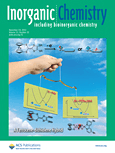
INORGANIC CHEMISTRY
Shaping the Future of Inorganic Science Through ResearchInorganic Chemistry, published by the American Chemical Society, stands at the forefront of the field of inorganic and physical chemistry, boasting an impressive impact in the academic community with a 2023 classification in the Q1 quartile across multiple categories including Inorganic Chemistry and Miscellaneous Chemistry. Since its inception in 1962, this esteemed journal has been a crucial platform for disseminating groundbreaking research, innovative methodologies, and comprehensive reviews integral to understanding the complex behaviors of inorganic materials. With a ranking of #12 out of 79 in Inorganic Chemistry and #37 out of 189 in Physical and Theoretical Chemistry according to Scopus metrics, Inorganic Chemistry has established itself as a premier destination for researchers, professionals, and students alike, eager to stay abreast of pivotal developments and trends in the discipline. Despite being a subscription-based journal, its esteemed reputation and critical contributions make it essential for anyone engaged in the exploration of inorganic chemical phenomena. As it prepares to converge into a new era by 2024, the journal continues to embody excellence and innovation, fostering a dynamic exchange of ideas essential for advancing this vibrant area of science.
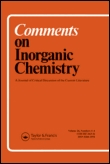
COMMENTS ON INORGANIC CHEMISTRY
Elevating Knowledge in Inorganic ChemistryCOMMENTS ON INORGANIC CHEMISTRY is a prestigious academic journal published by Taylor & Francis Ltd, specializing in the dynamic field of inorganic chemistry. With an impressive impact factor placing it in the Q1 category, this journal ranks #6 out of 79 in its field, reflecting its high influence and contribution to the discipline, with a remarkable percentile ranking of 93rd. Since its inception in 1981 and spanning publications until 2024, this journal serves as a crucial platform for researchers, professionals, and students to disseminate groundbreaking findings, review articles, and discussions on contemporary topics in inorganic chemistry. Although it is not an Open Access journal, the rigorous peer-review process ensures the publication of high-quality research. By bridging theoretical and practical aspects of inorganic chemistry, COMMENTS ON INORGANIC CHEMISTRY remains an essential resource for advancing knowledge and fostering innovation within the scientific community.
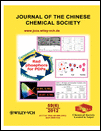
JOURNAL OF THE CHINESE CHEMICAL SOCIETY
Bridging Theory and Practice in Chemical SciencesJOURNAL OF THE CHINESE CHEMICAL SOCIETY, published by WILEY-V C H VERLAG GMBH, is a vital resource in the field of chemistry, focusing on a broad array of topics pertinent to general chemistry and its advancing sub-disciplines. Established in 1954 and running through 2024, this journal serves as a significant platform for the dissemination of high-quality research, showcasing innovative findings and developments within the chemical sciences. With its Q3 category ranking and positioning at Rank #203 in General Chemistry per Scopus, it reflects the journal's commitment to research excellence and impact. While not an open-access publication, it ensures accessibility to a global audience, making it an essential tool for researchers, professionals, and students alike seeking to stay informed and engaged in the evolving landscape of chemistry.